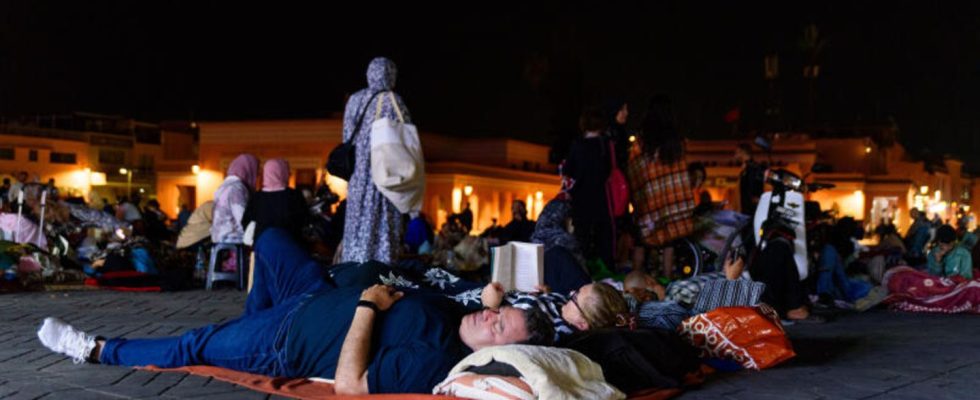After the devastating earthquake
Morocco vacationers defy the destruction: “Don’t let the earthquake ruin everything”
Protection from aftershocks: People sleep in Jamaa el-Fna Square in Marrakesh
© Davide Bonaldo / SOPA Images via ZUMA Press Wire / DPA
The earthquake in Morocco has changed the capital Marrakesh. Some holidaymakers still don’t want to leave – out of solidarity. Tourism is vital for many locals in the city.
Almost empty streets in the old town of Marrakech: Only a few tourists visit after the devastating Earthquake still leaves the Medina littered with rubble. They are determined to continue their vacation even after the disaster.
Tourism is the lifeblood of the North African country’s economy – and Marrakesh is the main attraction. After the deadly earthquake, fears arise that the deep fall in the corona pandemic could repeat itself. The few tourists in Marrakech’s old town also see the fact that they are not cutting short their vacation as a gesture of solidarity.
“We won’t let the earthquake ruin everything,” says a 35-year-old German as she takes a guided tour of the medina. “There were no warnings of a new major risk, so we stuck to our plans.”
Almost 2,500 dead after earthquake
The 35-year-old is one of four participants in the group tour. All of them had been evacuated from their hotel rooms Friday night when the 6.8 magnitude earthquake hit the country. Entire villages were destroyed, and by Monday afternoon the authorities had registered almost 2,500 fatalities and over 2,470 injured.
“We’re still hesitating whether we should leave or not, but it seems relatively safe,” says 26-year-old tourist Dominik Huber. “And if we stay, we will also do a small part to support the Moroccans.”
The small group stands in front of the imposing wooden gate of the now closed Bahia Palace. The Moorish-style palace, built in the 1860s, suffered some damage from the earthquake, with shattered green-glazed terracotta tiles lying on the floor.
Cracks run through the pink walls of the buildings in the surrounding streets. Some houses are just piles of rubble. The city guide assures his small group that the majority of the tour through the old town, which was founded almost 1,000 years ago, is possible despite the damage.
Fear and pray
State of emergency in Morocco – the desperate search for those buried continues
The city has changed
Not far away, three Italians ask police officers whether Marrakech’s sights are open to tourists. Another couple also decided to stay and are now drinking tea on a tiled terrace in the shade. Meanwhile, in one of the few shops open, a woman in flip-flops and a straw hat is haggling over the price of a leather bag.
In the famous Jemaa el-Fna Square, residents of the destroyed houses, who had previously spent the night outdoors, have given way to the usual perfume and fruit juice sellers. But the city has changed, and nothing is left of the otherwise so busy atmosphere.
According to the non-governmental tourism observatory, around 6.5 million tourists came to Morocco in the first half of the year, most of them from Europe or the United States. According to them, this is an increase of 92 compared to the same period last year. However, the observatory fears that the negative effects of the earthquake will reverse the positive trend.
Major earthquake
Rubble, fear and exhaustion – the suffering of the survivors in Morocco
The effect on business is already noticeable
According to information, Marrakesh is the country’s biggest tourist magnet with more than 4.3 million visitors. Some business people are already feeling the effects of the quake. “Entire tour groups have already canceled for fear of aftershocks,” says 56-year-old Dahman Siani, who runs a hammam.
“The medina is the soul of Marrakech, our pride. Tourism accounts for 99 percent of our income,” he continues. “If that dies, it’s all over,” he says. Siani recalls the beginning of the corona pandemic in spring 2020, when Morocco imposed a strict lockdown. At that time, the entire travel industry came to a standstill. “We can now only keep our fingers crossed and hope that such a catastrophic period does not happen again,” he says.

